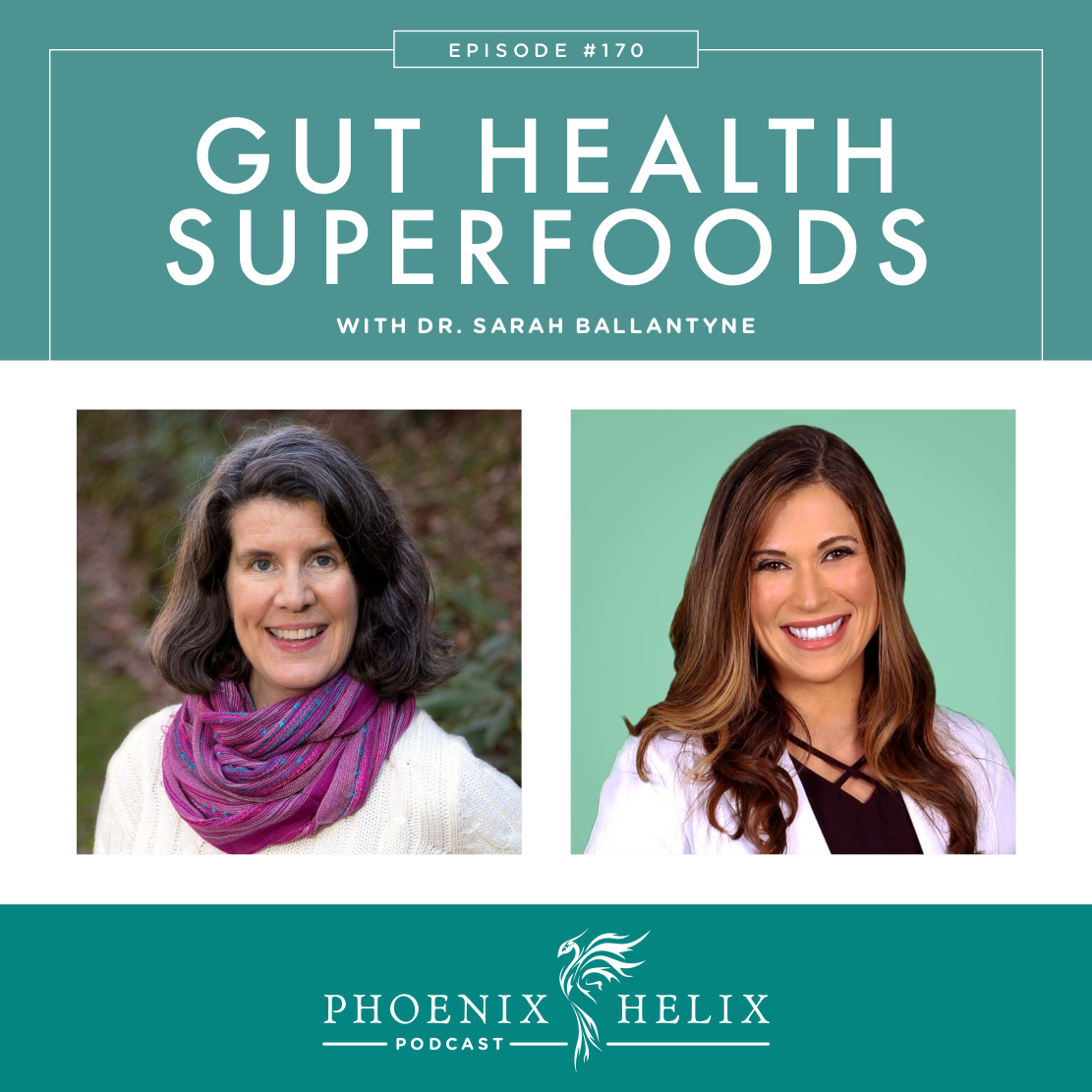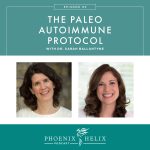Maximizing Autoimmune Health Through Gut Health
Gut health and autoimmune health are intimately connected. So, focusing on foods that promote gut health makes sense. What qualifies as a gut health superfood? How can we incorporate more of these foods into our diet? Can a healthy food for one person be unhealthy for someone else? How do we determine the best “superfoods” for us? My guest is Dr. Sarah Ballantyne, bestselling author and leader in the paleo autoimmune community. She’s spent the last six years deeply researching gut health and shares her findings with us today.
Listen to the Show
- Subscribe to my podcast through your favorite podcast app: iTunes, Stitcher, Google, TuneIn, Spotify, Amazon, etc.
- You can also listen to the episode right here through the player below, and if you subscribe to my newsletter you’ll get notified of future episodes.
Podcast: Play in new window | Download
Show Notes
- Intro (0:00)
- Thank You To Our Podcast Sponsor – Functional Nutrition Alliance (1:44)
- Full Body Systems is an internationally acclaimed, 10-month online functional nutrition immersion training program.
- It’s designed by world-renowned educator, Andrea Nakayama. Many of you know her as one of my most popular podcast guests. Her unique way of working with patients often leads to results where other practitioners hit dead ends. This program teaches you to do the same.
- If you’re already trained as a health coach, nutritionist, or medical practitioner and want to more effectively help your clients break through healing plateaus, this class is for you!
- And if you’re an aspiring practitioner just getting started, this might be the only training you need.
- You’ll gain detailed knowledge of all the systems in the body, how they interact, how problems develop, and how to personalize diet and lifestyle recommendations for each unique client.
- Enrollment is currently open. To learn more, visit FxNutrition.com/Eileen.
- Meet Sarah
- Dr. Sarah Ballantyne is a former research scientist who applies her scientific mind to writing about optimal health. She’s a leader in the paleo autoimmune community and the author of multiple bestselling books, including The Paleo Approach (often called the AIP Bible). Her newest e-book is The Gut Health Guidebook. Sarah also has autoimmune disease herself.
- Listen to my prior interviews with Sarah:
- What Defines a Gut Health Superfood? (3:29)
- One that supports the functions of the gut: digestion, barrier function, immune system regulation, detoxification, gut hormone regulation, and a healthy microbiome.
- To qualify as a superfood, it doesn’t have to support every function. If a food strongly supports one function without interfering with any others, that’s still beneficial. However, most gut health superfoods help multiple functions, because the gut is an interactive system.
- The microbiome is involved in all gut functions, so it takes priority in the “superfood” designation.
- The second most important focus is gut barrier function (preventing leaky gut and the problems that result from that).
- AIP Gut Health Superfoods (7:14)
- These are all allowed during the elimination phase of the Paleo Autoimmune Protocol.
- Diversity is the goal, because each of these foods is uniquely beneficial to the gut. Ideally we want to eat from all of these food families once every three days. However, don’t obsess about it! This is an informal checklist – use it inspirationally to widen the diversity of the food you eat.
- High-fiber & phytonutrient fruits & veggies
- Cruciferous veggies
- Roots
- Squashes
- Alliums
- Leafy greens
- Parsley family
- Ginger family
- Mushrooms
- Berries
- Apples
- Citrus
- Melons
- Stone fruits
- Tropical fruits
- Sea vegetables
- Extra-virgin olive oil
- Fish
- Shellfish
- Honey & bee products
- Fermented foods
- Edible insects
- Tea, herbs, and AIP spices
- Bone broth
- Organ meat (contains many of the nutrients that specifically support gut health)
- Why Food Diversity Matters (12:06)
- Every food has a unique nutrient profile. Every gut health superfood has unique benefits for the gut.
- A diverse diet supports a diverse microbiome, because each bacteria has its own favorite food, and each bacteria performs a unique role in the gut.
- A diverse microbiome helps prevent pathogenic bacteria from taking over. Some bacteria even produce selective antibiotics that kill pathogens without harming beneficial bacteria.
- The good news is that diversity is more important than quantity among the superfoods. You don’t need to eat large amounts from every category. Small amounts are enough to provide a gut health benefit.
- This was shown in a recent study by American Gut. They compared people who eat more than 30 plant foods per week against people who ate less than 10. The 30+ group had healthier and more diverse microbiomes.
- Even varying the herbs and spices you eat can diversify your microbiome and enhance gut health.
- What Makes Teas, Herbs, and Spices Special? (18:12)
- Polyphenols are micronutrients that are extremely beneficial. Teas, herbs, and spices contain these in abundance.
- We only absorb 5% of polyphenols directly. The other 95% needs to be metabolized by gut bacteria first before we can access their benefits. Polyphenols are potent antioxidants, anti-inflammatories, and are also liver protective, neuroprotective, heart protective, and reduce cancer risk.
- Polyphenols feed beneficial bacteria and kill some of the worst opportunistic and pathogenic bacteria.
- As beneficial bacteria populations grow, they in turn feed and support other beneficial bacteria, diversifying the microbiome even more.
- Resources:
- Mushrooms: Sarah’s New Favorite Food Group (25:05)
- Mushrooms are different from fruits and vegetables because they are edible fungi, which makes them their own food kingdom. They are rich in unique polyphenols and also a class of nutrients called triterpenes. In addition to the polyphenol benefits mentioned above, mushrooms have immunomodulatory benefits.
- They are rich in 3 types of fiber that aren’t common elsewhere, and this fiber feeds unique beneficial bacteria.
- Research show that eating mushrooms reduces gut pathogens, increases key probiotic strains, and increases diversity.
- Mushrooms are also rich in vitamins and minerals.
- Each variety of mushroom provides unique gut health benefits.
- Resource: Elevating Mushrooms to Food Group Status.
- Dietary Fats and Gut Health (29:08)
- Saturated fats promote gram-negative bacteria, which aren’t all bad, but they contain an endotoxin in their cell membrane that is inflammatory if it gets into the bloodstream. Saturated fats are also “lipid rafts” that help deliver things into the bloodstream. So, saturated fat combined with leaky gut is a bad combination. Sarah recommends limiting saturated fat to 15% of daily calories.
- Mono-unsaturated fats (olive oil and avocado oil) promote gram-positive bacteria and a healthy microbiome. They’re also anti-inflammatory and associated with lower disease risk.
- Research studies that compare a wide variety of fats on the microbiome show that omega-3 fatty acids (found in seafood) are the most beneficial, and extra-virgin olive oil is a close second.
- Sarah’s diet: She still eats meat which contains saturated fat and occasionally uses unrefined coconut oil, ghee, and pastured lard in her cooking. (These fats have benefits in moderation.) However, since doing her research, she has switched to using extra-virgin olive oil as her primary cooking fat. (It’s a myth that you shouldn’t cook with olive oil. A high-quality olive oil has a high smoke point.)
- Resources:
- Thank You To Our Podcast Sponsor – Luminance Skincare (37:01)
- This week, I’m highlighting their line of facial masks. The Fruit Enzyme Exfoliating Mask is designed to gently and safely remove spent skin cells without distressing your skin. The Green Clay Clarifying Mask is perfect if you’re troubled with oily skin or breakouts – it absorbs the excess oil and eliminates impurities. The Antioxidant Mask is designed to eliminate the damaging free radicals that collect in your skin through the day. The Rosewater Hydration Mask is perfect for all skin types – in fact, it can be left on your skin overnight as a deep moisturizer.
- Whereas conventional skincare products are full of chemicals that can hurt our bodies, Luminance is made from ingredients that nourish. Their products are natural, organic, wildcrafted, non-GMO, and gluten-free (and they’re even made in a dedicated gluten-free facility). They’re also handmade in small batches within the United States.
- They have a complete face and body care line, including cleansers, toners, moisturizers, masks, acne serum, sunscreen, haircare, and more.
- Place an order here, and use the code HELIX for 10% off your first order.
- Cocoa and Coffee (38:37)
- Since these have potential gut health benefits, Sarah moved them into the stage one reintroduction category of first foods to try reintroducing. She also took into account the mental health effect – these are two foods many people miss the most.
- Coffee: Depending on the person, coffee can be inflammatory or anti-inflammatory. It appears to be genetic. That’s why it’s worth testing. If you do well with coffee, it can be a beneficial food, not just an enjoyable one. It’s very rich in polyphenols and also contains some fiber (even as a drink). Occasional consumption is considered a stage 1 reintro, and regular consumption is a stage 2 reintro.
- Cocoa: High-quality cocoa (one that isn’t dutch-processed) is high in anti-inflammatory phytonutrients that may also benefit the gut. There is some research showing that cocoa may stimulate part of the immune system (Th2 cells) but the research isn’t clear yet whether it stimulates or regulates the immune system. If research develops to show that it’s regulatory, that would be very exciting! Until then, it’s removed during the elimination phase but now considered a stage 1 reintroduction.
- Resources:
- Non-AIP and Non-Paleo Gut Health Superfoods (42:33)
- In addition to cocoa and coffee mentioned above, other AIP reintros that can benefit gut health (if tolerated) are nuts, seeds, and nightshades.
- Some non-paleo foods that can also benefit gut health are gluten-free oats (especially sprouted), rice (especially brown rice), dried legumes (soaked and cooked until soft), grass-fed A2 dairy (from goats, sheep, camels), and corn.
- If you have autoimmune disease, you may not tolerate all of these foods, but it’s worth experimenting – both for the gut health benefits and the mental health benefits. The wider and more flexible our diet, the easier it is to sustain over time. Follow the reintroduction protocol to see which foods do and don’t work for your body. It’s unique to each individual and also changes over time.
- Resources:
- Personalization: Not Every Superfood Works for Every Body (48:04)
- Just because research shows a food is beneficial for the microbiome doesn’t mean it will be beneficial for everyone. We’re all unique.
- All foods are a blend of “good and bad” – beneficial nutrients and ingredients that may be problematic. Don’t let this scare you – it’s simply a fact of nature. The healthier you are, the more foods you tolerate.
- With autoimmune disease, we are more prone to be sensitive to the problematic ingredients. That’s why the AIP is an elimination diet – removing potentially problematic foods and focusing heavily on nutrient density and diversity. This gives your body the nutrition it needs to start healing, foods that support gut health, and lifestyle recommendations that also lower inflammation. Then, as symptoms improve, you start reintroductions to see which foods you can add back into your diet. People tend to tolerate more foods in remission vs. when they are in a flare.
- There’s also bio-individuality. There are some foods that may increase inflammation or cause gut problems for you, while they work very well for someone else.
- When trying new foods, pay attention to the symptoms. Mild gut symptoms can simply be a sign of a shifting microbiome (mild gas, bloating, flatulence, belching, digestive noises). This isn’t a bad thing – it may be the first step to correcting gut dysbiosis. Lower the amount of the food but continue eating it and see if these symptoms resolve. You can start as low as a teaspoon of each food. However, if you have extreme gut symptoms (abdominal pain, diarrhea, severe constipation), or symptoms outside the gut (joint pain, rashes, headaches, increased autoimmune symptoms), that’s a sign to stop eating that food, at least for now.
- If you are having trouble with a high number of foods – either not able to reintroduce any foods successfully, or even struggling with certain foods on the AIP, and that lasts longer than three months, that’s a good time to work with a healthcare practitioner to start troubleshooting. Sometimes there are obstacles that diet and lifestyle alone won’t solve.
- Resources:
- Sarah & Eileen’s Personal Superfood Experiences (1:02:44)
- Sarah: Mushrooms may be her absolute favorite, but her biggest focus is food diversity. She receives a weekly box from Misfits Market, and she loves that it’s different produce varieties every week. She also consciously eats more fruit and starch now, and feels an energy boost from this change in her diet. She has a handful of nuts and seeds every day. And she incorporates one non-paleo food most days (corn, rice, legumes, or gluten-free sprouted oats). She limits these to one serving daily, because she doesn’t want to displace more nutrient-dense foods, but it’s wonderful to know she tolerates these foods as long as she doesn’t go overboard. In fact, corn and lentils make her feel great. She did have to overcome some food fear to attempt these expanded reintroductions, but she’s very grateful she did.
- Eileen: My favorite gut health superfood is bone broth. Especially early in my healing journey, I felt much better on days I drank it vs. not. Thankfully, I also do well with most of the AIP superfood list, and I’ve also successfully reintroduced some non-AIP superfoods (cocoa, nuts, and seeds). I can also have non-paleo foods occasionally in small amounts with no worries (like corn, legumes and gluten-free grains) but quantity matters. If I have a large serving, I will get inflammation. I usually consume these when I’m out of the house rather than make them at home, but I appreciate that diet flexibility.
- Outro (1:09:20)
- Dr. Sarah Ballantyne has an information-rich website: The Paleo Mom. There you’ll find research-based articles, The Whole View podcast, her bestselling books including her new Gut Health Guidebook, and more.
- Eileen (your podcast host) is the author of multiple books, written to help people thrive with autoimmune disease. Learn more on the Books Page.
- If you like this podcast, follow or subscribe through your favorite podcast app. You can also subscribe to Eileen’s biweekly newsletter.
- Check out the entire archive of podcast episodes.
You May Also Be Interested In
Spreading the Word
If you like the podcast, please leave a positive review in iTunes. It would mean the world to me, and also helps others find the podcast. Here are some quick instructions using your iPhone:
- If you are already subscribed to my podcast: (1) Click the purple podcast icon. (2) At the bottom of the screen, click Library. (3) At the top of the screen, click Shows. (4) Click the Phoenix Helix podcast image. (5) Scroll down the page, and you’ll see Ratings and Reviews. Scroll down a little bit more and click on Write a Review. This will bring up the review screen. Tap 5 stars (if you love the podcast), and then click in the title box, and it will bring up the keyboard. Enter a title and short review. (6) Click Send in the upper right corner. (7) Thank you! Positive reviews give the podcast a higher search ranking in iTunes, helping people find it and letting them know it’s a quality podcast and worth their time to listen.
- If you haven’t subscribed to my podcast: (1) Click the purple podcast icon. (2) In the lower right corner, click the magnifying class. (3) Type Phoenix Helix in the search box. (4) Click the podcast cover in the Show list. (5) If you’d like to subscribe, click the + sign at the top of the screen. (6) To write a review, scroll down the page, and you’ll see Ratings and Reviews. Scroll down a little bit more and click on Write a Review. This will bring up the review screen. Tap 5 stars (if you love the podcast), and then click in the title box, and it will bring up the keyboard. Enter a title and short review. (7) Click Send in the upper right corner. (8) Thank you! Positive reviews give the podcast a higher search ranking in iTunes, helping people find it and letting them know it’s a quality podcast and worth their time to listen.









I’ve already listened to this podcast three times! There was so much good information but Dr. Sarah speaks so quickly and uses such big words. You’ve reenergized me to get more spices and mushrooms in my diet. This was all such great information. I went AIP nine months ago and have now listened to every one of your podcasts. My family is tired of my saying, “I heard this podcast that said…” but my understanding of autoimmune diseases and AIP has increased exponentially. Thanks for everything Eileen.
Lee, what a beautiful testimonial! Thank you so much for taking the time to write.